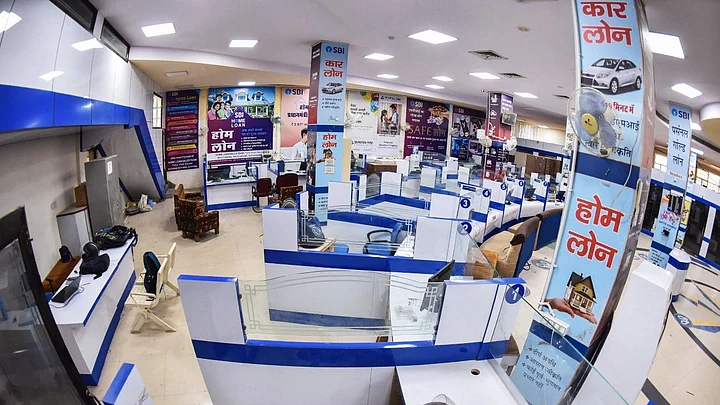Banking services around the country took a hit on Monday, 15 March, as over ten lakh bank employees went on a two-day strike, protesting the privatisation of two public sector banks and 'retrograde' banking reforms.
80,000 bank branches participated in the strike, affecting clearance of cheques worth ₹16,500 crore, said trade unions to Mint.
The strike was announced after a failed conciliation meeting between the bank unions and the Union Finance Ministry on 4, 9, and 10 March, reported IANS. The unions asked for the government to reconsider privatisation, as it may lead to job loss.
In the Union Budget presented in February 2021, Finance Minister Nirmala Sitharaman announced the privatisation of two public sector banks (PSBs) as part of its disinvestment plan.
Who Called The Strike?
The strike was called by the United Forum of Bank Unions, an umbrella body of nine associations and groups.
The bank unions are All India Bank Officers’ Confederation (AIBOC), All India Bank Employees Association (AIBEA), National Confederation of Bank Employees (NCBE), All India Bank Officers’ Confederation (AIBOC), Bank Employees Federation of India (BEFI), Indian National Bank Employees Federation (INBEF), Indian National Bank Officers’ Congress (INBOC) and National Organisation of Bank Officers (NOBO) and National Organisation of Bank Workers (NOBW), reported ANI.
Four General Insurance Companies will be on strike on 17 March, and all unions in LIC are on strike on 18 March. The government has privatised IDBI bank by selling majority stake to LIC in 2019 according to IANS, and has merged 14 public sector banks in the last four years.
Banking Services Affected
The strike commenced on 6 am on Monday, and is likely to end on Tuesday, at midnight. The banks were closed over the weekend on 13 and 14 March, leading to a four-day break in regular operations. Therefore, services such as deposits and withdrawals, cheque clearances and loan approval has been affected, added the report.
Since payments are being affected, the strike is likely to have an impact on the stock market as well.
Online banking facility will continue to operate on strike days, and ATMs are functional for use as well.
The banks on strike, including State Bank of India, have informed customers that normal services would be affected. But unions are trying to ensure that other services function smoothly.
While functioning of PSBs are affected, services at private banks like ICICI Bank, HDFC Bank, Kotak Mahindra Bank and IndusInd Bank remain unaffected by the strike.
An HDFC bank official said there was no major impact of the strike on their operations. However, these banks form one third of the banking sector in the industry, added the report.
Congress Extends Support
Congress General Secretary Randeep Surjewala said, “We stand in solidarity with 10 lakh bank officials and staff participating in the strike against reckless privatisation of public sector banks,” adding that there is no rationale for selling state owned lenders to private lenders, noted IANS.
The Congress emphasised that this move was a “desperate attempt to meet the disinvestment target of Rs 1.75 lakh crore”, and that “PSU banks are not just profit-making ventures, they have in the past been used as vehicles of social reforms,” added the report.
Congress stated that public bank outreach must be accessible to populations in villages and smaller towns, a move that private lenders will not prioritise.
Alleging that the government is running away from the responsibility of better governance in public sector banks, Congress asked for higher accountability and not outright sale, added the report.
(With inputs from ANI, IANS and Mint)
